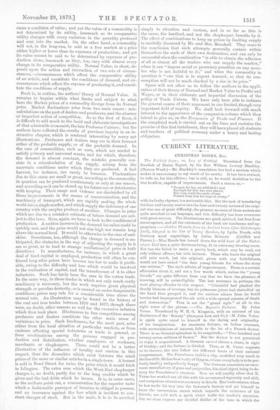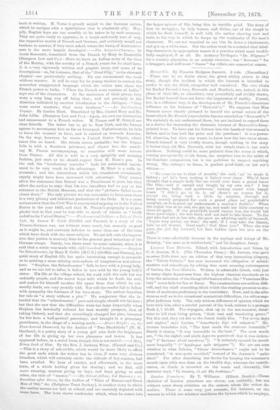CURRENT LITERATURE.
CHRISTMAS BOOKS, Ere.
The Frithjof Sega ; or, Lay of Frithjof. Translated from the Swedish of Esaias Tegner, by the Rev. William Lowery Blaokley. (Marcus Ward.)—Mr. Blaokley's translation has had a success which makes it unnecessary to say much of its merits. It has boon revised, he tells us, for this edition ; but is still, as he would doubtless be the first to allow, capable of improvement. Such a stanza as,—
" To gain for her, no wild-bird's nest Too high for him was ever placed, or oven could the eagle strong
Protect from him her eggs or young,"
with its faulty rhymes, is a noticeable blot. But the task of translating the four-and-twenty cantos into the four-and-twenty metres of the origi- nal was one of great difficulty, the greater, as some of those metres are quite unsuited to our language, and this difficulty has been overcome with great success. The illustrations are good, spirited, but free from extravagance, and all the externals of the book are handsome and ap- propriate.—Goiden Threads from an Ancient Loom (Das Niebelungen Lied), Adapted to the Use of Young Readers, by Lydia Hands, with
fourteen wood engravings, by Julius Schnorr. (Griffith and Farran.)Miss Hands has tamed down the wild hero of the Niebel- ungen Lied into a quite decorous being, fit to enter any drawing-room. Nor has she failed to make a pretty book, which may be read, not only without offence, but with interest. Those who know the original will miss much, but the original, given with any faithfulness, would not have suited "the dear young friends for whom the story was written." The style admits of improvement. There is a certain affectation about it, and not a few words which, unless the "young friends" are quite different from nny that we have the pleasure of knowing, will be unintelligible. The last sentence is, perhaps, the most glaring offender in this respect. " Crionihild had plucked the deadly blossom of revenge, but its poisonous juices had shrivelled up the hand that grasped it., and the noxious odours from its fo3tid berries had impregnated the air with a wido-sproad miasma of death and destruction." That is not the "grand style" at all in the right sense of the phrase.—The Revolt's Fortune. By Jules Verne. Translated by W. H. G. Kingston, with an account of the Mutineers of tho ' Bounty ' (Sampson Low and Co.)—M. Jules Vella° is again quite equal to himself in the daring and originality of his imaginations. An enormous fortune, an Indian treasure, with accumulations of interest, falls to the lot of a French doctor. There is an Oriental splendour in its magnitude,—" Five hundred and twenty-sevon millions of francs." But the doctor is not permitted to enjoy it unquestioned. A Gorman savant claims a share, in right of kinship ; and the fortune is divided. Then, as M. Verne requests us to observe, the two follow the different bents of their national temperament. The Frenchman builds a city, modelled very much in the line of Dr. Richard eon's city of Tlygeia, where everybody is to be per- fectly healthy and perfectly happy. The German constructs an enor- mous manufactory of gnus and projectiles, bis chief object being to de- stroy the Frenchman's creation. Now we will readily allow that M. Verne has worked out all this with his accustomed ingenuity and skill, and scrupulous attention to accuracy in details. Max's adventures, when he has mode his way into the German's factory and sot himself to learn the tremendous secret which imperils the existence of his friends, are told with a spirit which holds the reader's attention. But we must express our decided dislike of the tone in which the book is written. M. Verne is grossly unjust to the German nation, which he maligns with a spitefulness that is absolutely silly. Hap- pily, English boys are too sensible to be taken in by such nonsense. They are quite ready to appraise, in a rough-and-ready sort of way, the respective merits of Freneh and Gorman, and certainly would not hesitate to answer, if they were asked, where the bump of destructive- ness is the more largely developed.—The Serpent-Charmer, by Louis Rousselot, translated from the French by Mary de Haetevillo (Sampson Low and Co.)—Here we have an Indian story of the time of the Mutiny, with the novelty of a French youth for its chief hero. It is a very vigorously written and graphic story, and some of its descriptions—as, for instance, that of the' Dead City," in the eleventh chapter—are particularly striking. We can recommend the book without reserve. It will be easy for its young readers to correct the somewhat exaggerated language which the writer uses about the French power in India. "When the French were masters of India," says one of the characters. At the maximum of their power, they were a very long way off being that ; and not precisely in the direction indicated by another interlocutor in the dialogue,—" they were never masters ; they were brothers."—An Involuntary Voyage. By Lucien 13iart. Translated by Mrs. Cashel Hoey and Mr. John 14111.. (Sampson Low and Co.)—Again, we owe our instruction and amusement to a French writer. M. Pinson and M. Boisjoli are close friends. The latter has to go to New York, and the former agrees to accompany him as far as Liverpool. Unfortunately, he fails to leave the steamer in time, and is carried on towards America. On the way, however, he meets a United States frigate, which takes him on board. His return seems probable; but the frigate falls in with a Southern privateer, and chases her, the unwill- ing M. Pinson accompanying, tu cuuutries still more remote from France. All this is told in a very sprightly and amusing fashion, just such as we should expect from M. Biart's pen. In the end, the "involuntary traveller" finds his unintended banish- ment to be very much to him advantage. M. Blurt is a trifle in- accurate ; and the corrections which the translators occasionally supply might have beeu increased with advantage. They cannot allow the statement that Brunel was a Frenchman to pass, but they allow the author to state that his two travellers had to pay at the entrance to the British Museum, and that the "pictures failed to en- chant them." The only picture we can remember to have seen there is a very gloomy and indistinct portraiture of the Dodo. It is a more serious error that the Civil War is represented as going on in the United States in the year 1853, and that M. Pinson's geography is so pro- phetic that in that year he was able to speak of Alaska as " lately ceded to the United States."— Workman and Soldier : a Tale of Paris Life, by James F. Cobb (Griffith and Ferran), is a story of the Franco-German war, not without some merit, but scarcely as good as it might be, and certainly inferior to more than one of the tales which have dealt with the same subject. We are left with the impres- sion that justice is scarcely clone to the general good behaviour of the German troops. Surely, too, there must be some mistake, when it is said that a sortie was made with eight hundred battalions.—Stephen the Schoolmaster, by Mary E. Gellie (M.C.B.) (Griffith and Farran), is a quiet story of English life, but quite interesting enough to reconcile us to quitting a more stirring atmosphere of imagination and adven- ture. "Stephen the Schoolmaster" falls in love with a young lady, and as we are led to infer, is fallen in love with by the young lady's sister. His life at the village school, his work with the rude but not unkindly people, and tho secret hope with which he feeds his soul, and makes for himself another life apart from that which he out- wardly leads, are very prettily told. Nor will the reader fail to follow with sympathy the fortunes of hi a love-story. The author describes her tale as "a story without a plot." We conjecture that she in- tended that the "schoolmaster," pure and simple, should win his love ; bnt that she saw that the difficulties were too large (especially when Stephen has heroically refused his best worldly prospect, that of taking Orders), and that she accordingly changed her plan, invented for her hero a half-genteel parentage, and brought in a pecuniary providence, in the shape of a missing uncle.—Honor Bright ; or, the Four-Leaved Shamrock, by the Author of "Two Blackbirds" (W. W. Gardner), is a pretty story of a young girl who finds the brightness of her life in giving up her own pleasures and tastes. It has appeared before, in a aerial form, though this is not stated.--A Man, Every Inch of Him. By the Rev. J. Jackson Wray. (Cassell and Co.) —This is a story of school-life, which would be more likely to effect the good ends which the writer has in view, if some very obvious blunders, which will certainly excite the ridicule of boy-roaders, had been avoided. We hear of cricket, and afterwards, in the same term, of a whole holiday given for skating ; and we find, still more amazing, masters giving to boys, and boys giving to each other, the title of "master."—My School-fellow, Val Bowaser ; or, Sunshine after Storm, by the Author of "Tales of Heroes and Great Men of Old," &e. (Religious Tract Society), is another story in which the earlier scenes are laid at school, and arc certainly depicted with some force, The hero shows tendencies which, when he comes into the larger sphere of life, bring him to terrible grief. The story of how he struggles, by help human and divine, out of the slough in which he finds himself, is woll told, the author showing tact and taste in the way in which lie keeps up the continuity of the man's character. We are not required to see him lie down a blackamoor, and get up a white man. But the writer must be reminded that label- ling characters by appropriate names is a practice which must be skil- fully employed, if at all. Mr. Anthony Trollope's "Dr. Filgrave " for a country physician, is an artistic creation ; but " Bownser " for a braggart, and still more " Snare" for villain, are somewhat worse.



































 Previous page
Previous page